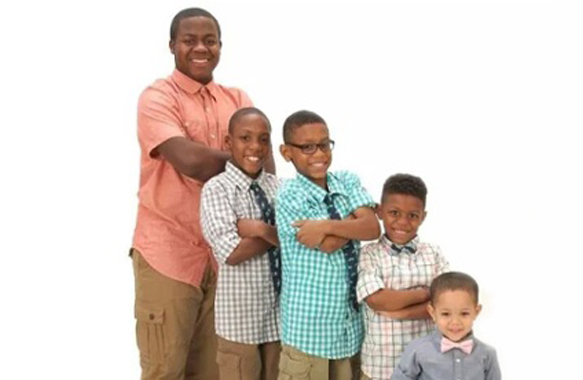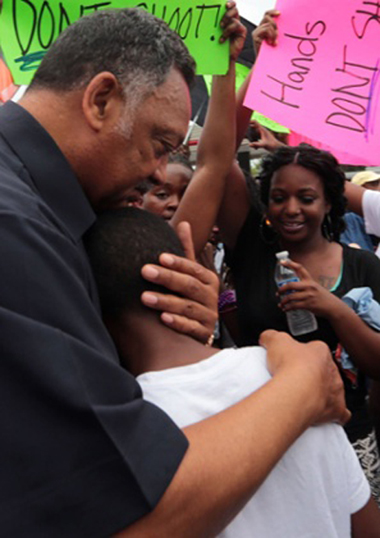~ Joseph Joubert (Moralist. Essayist)
Many facebook groups are devoted to education. Let’s take a peek. Hmmm. On innumerable pages, the whole child conversation looks bleak. Yes, there is talk of play and the need for recess. But what about the lessons learned at home or on the streets? In Ferguson, New York City, Los Angeles, and in Detroit, children meet – Young kids meet the police. This too is a lesson. But in facebook education groups it seems to be a breach. The mere mention is often followed by a question. “What does this have to do with education?” It is not about Common Core. It is not about testing. It is about our children, their wisdom, and how we can learn from what our youth teach.
Wisdom from Ferguson’s kids: ‘They shouldn’t shoot people for protesting’
How will five black brothers ever trust the police or this violent city ever again? How can anyone
By Steven W Thrasher in Ferguson | Originally Published at The Guardian. August 18, 2014 07.15 EDT |
When I asked six-year-old Amor, who wants to be a firefighter and who lives here in Ferguson, Missouri, what he thinks of the police, he said, “They shoot people.”
The children of Ferguson have an especially painful – and unfairly adult – task before them: they must make sense of the death of one of their peers, Michael Brown, and deal with the fallout from the protests, violence and militarized police presence that has, in many ways, quickly come to define their young lives in the week since Brown’s violent death at the hands of a local police officer.
The police response to protests in Ferguson has affected children as much as the death itself. Amor’s 11-year-old brother, Tavier, told me, “They shouldn’t shoot people for protesting.” Sitting over pizza just a few blocks from the Ferguson Police Department, he added, “As I was getting older, I thought police were nice people, and as I’m getting older, I’m thinking they’re so-so. They’re still good people, but they’re judging us now.”
Children cope with tragedy in myriad ways – and many of the younger kids in Ferguson are using sidewalk chalk in public spaces. At the now infamously torched QuickTrip convenience store, amidst messages from adults, I saw children sketching Superman and dinosaurs – a small measure of their innocence reflected while their families protested around them. But at Greater St Mark Family Church, where Saturday’s march from the site of Brown’s shooting ended, the drawings were more explicit: kids drew outlines of their own imagined dead little bodies.
Kids in Ferguson have been drawing their own chalk outlines to memorialize Michael Brown.
Most of Ferguson’s children are African American, which automatically makes them, particularly the boys, suspect. The weight on their small shoulders that they must be up to something is heavier now than it already was 10 days ago, before the unarmed, 18-year-old Brown was killed.
Amor and Tavier’s mother is Shonta Jones, who has three other sons between the ages of three and 16. Like any parent, she wants to protect her boys from knowing too much about violence – but she is distinctly aware that a boys will be boys attitude is not a luxury her sons can afford. Her sons have to earn their innocence in Ferguson, but it comes at the expense of letting go of the assumptions of childhood at a very young age.
Her 10-year-old, Antonio, for instance, didn’t used to fear the police. “One time, a couple people stole our bikes and scooter,” he told me, and the police “came and got our stuff back. So I was happy with them.”
But after Trayvon Martin’s violent death (while wearing a hooded sweatshirt) and now Brown’s, he fears for his older brother, Taujh:
I was afraid when they killed
Taujh, 16, said he had been far less concerned about being racially profiled than his brothers or mother are for him. A couple weeks ago, he told me, he’d found the cops to be “nice and funny.” But now, “with the riots, I don’t want to be accused of anything,” he said. “So I stay in front of my house.”
“As of right now”, he said, “I don’t trust [the police] at all.”
Open contributions: Help the world hear your police racial profiling story
It was more than just Brown’s death that changed Taujh’s mind: like his 11-year-old brother Tavier, it was seeing a militarized police force turned on his town.
That made me not trust them, either. I heard people were just protesting peacefully, or whatever. They started using teargas on them. I saw a picture of a woman, a white woman, she had a big wound on her stomach from a rubber bullet. That made me not trust them. I play a lot of games. I saw a picture of a man, a sniper on a roof, like Call of Duty or Battlefield. I thought it was from a game! … But it was real. And I thought, ‘This isn’t Iraq, this is Ferguson!’ I said, ‘That’s messed up.’ … What’s the point of bringing a tank? Are you going to blow up everybody? That’s not necessary.
Tavier added, “I think [the police are] not scary, but they make me nervous”, noting that, during the protests, officers “were shooting with rubber bullets, and a woman got shot in the stomach. And Mike Brown got shot.”
Still, Tavier says he would call the police if he was in trouble. “I would tell them what’s going on,” he says, adding with downcast eyes, “If I see them, I wouldn’t run.”
His 10-year-old brother, Antonio, is less sanguine after seeing where Brown was shot: “I thought, if I call the police, and they thought I was the person that did whatever I had called [about], they might shoot me or tase me.”
I, too, spent some time where Brown was shot and saw Lesley McSpadden, Brown’s grieving mother. She was surrounded by women who gently gave her hugs as she shuffled along the sidewalk like a ghost, looking only half alive.
Shonta Jones can too easily imagine being in McSpadden’s shoes, and told her oldest, Taujh, that “Mike Brown could have been you, and it hurt my soul.” Jones is terrified of the double standard on display when the police deal with people who look like her son: “Even if [Brown] stole cigarettes it wasn’t worth killing him,” she said, adding “even the guy who shot up the movie theater didn’t have to lose his life.”
“I feel like we were treated very poorly when it came to our rights,” she says. “They are taking away protesting because there were too many black people speaking up in one place.”
After I interviewed Jones and her sons, I spoke with the Reverend Jesse Jackson here and asked him what he thought of Jones’s fears for her five boys.
“Those concerns are real” in Missouri and all over the nation, Jackson told me. “My boys have been profiled,” he added, before ticking off a list of deaths of young black men at the hands of the police around the country. For these five brothers in Ferguson, the news has meant having to grapple with these same violent current events at their much younger ages.
Tavier, the second-oldest in the family, has already had “the talk” with his dad about how to manage police harassment. But at 11, his takeaway was that his dad wanted him to “see how the police are thinking, [so] I know not to get dreads” to better coming avoid suspicion. Taujh, the oldest, told me initially that he’s not worried: “I’m not bragging, but I’m an all-around good kid.”
But after listening to his mother and brothers, he owned up to his mistrust of the cops and said, “It was good to get that off my chest.”
Still, whether Tavier, Antonio, Taujh, Amor and three-year-old Zion are “good kids” or not might not matter in Ferguson – or anywhere else in America. And after the protests are over and the politicians look away, if nothing has changed, these boys will still live their lives under a cloud of suspicion.
“That’s the real violence,” as Jesse Jackson put it: when children live in neighborhoods devoid of opportunity, under an assumption of guilt which robs them of the presumption of innocence and dims their view of what may be possible in their world and their lives. The status quo is as dangerous as the events of the last week for children in places like Ferguson. If that isn’t challenged once the teargas clears, this loss of light in kids like these will be even more of a tragedy.













Leave A Comment